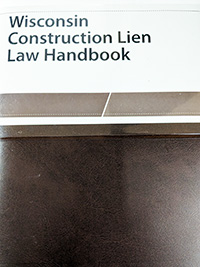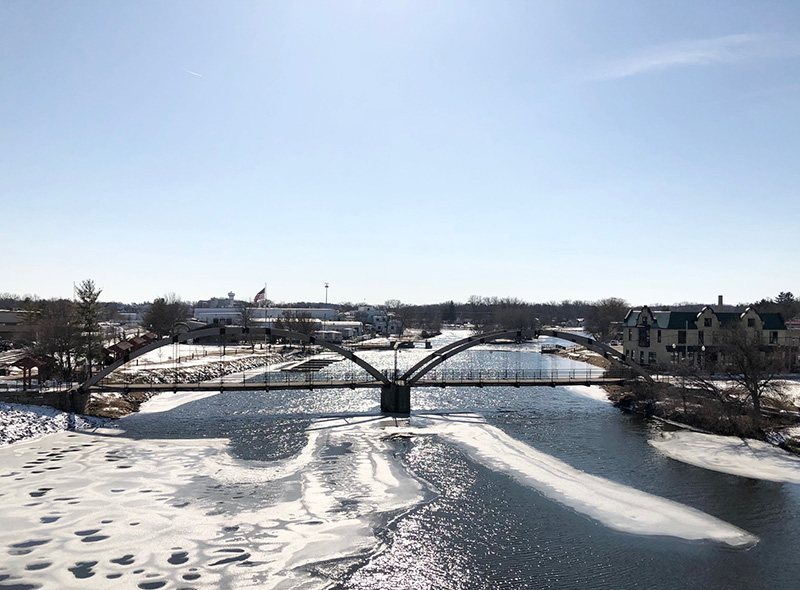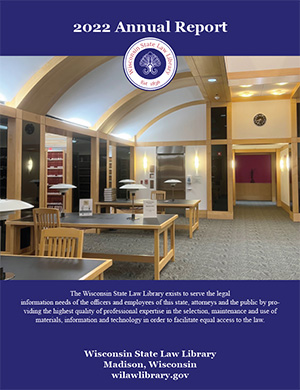WSLL @ Your Service March 2023
Contents
Year in Review - Amy Crowder
Callers to the State Law Library often tell us, "I'm not sure I'm calling the right place" or "I'm not sure who can help." We quickly assure them contacting a library is often a good first step.
It can sometimes be a challenge to know where to turn for help or how to start your legal research. Our reference librarians are ready to offer our expert assistance. We can help you to research a legal issue and locate case law, statutes, regulations, articles, and forms. We can connect you to an appropriate agency or refer you to a legal assistance organization in your area.
The State Law Library does so much more than directing you to information.
We teach continuing legal education classes. In 2022, we introduced classes on tax research, basic knowledge of legislative research, and missing or repealed statutes. Many classes are taught online so you can attend from anywhere.
In 2022, the library debuted a new ePayment page on the Wisconsin Court System website, allowing customers to purchase forms and pay library fees online anytime. After credit card payment, forms are sent via U.S. Mail. The Wisconsin Basic Will, a form based in Wisconsin Statute 853.55, is one example of a high-demand form. Commonly used rental forms are also available.
Carol Hassler, Access Services Librarian, along with Bryce Pierson with the Office of Judicial Education, received a 2022 Legal Innovator Award from the State Bar of Wisconsin. The award is in recognition of the work done to host the jury instructions online at the library's website. Wisconsin jury instructions are created as models, checklists, or minimum standards to assist judges and lawyers in providing instructions to jurors who must reach verdicts during trials. During 2022, the jury instruction pages were visited or documents downloaded over 400,000 times.
The library has been archiving appellate briefs since 1839. Our collection of appellate briefs and appendices exists in three different formats: bound volumes, microfiche, and digital images. The print archive currently consists of 8,073 bound volumes. This physical archive grows at an average of 15 linear feet per year.
Librarians reached out to our Wisconsin community to share information about library services:
- Reference staff presented at the UW Law School, new judges orientation, and statewide professional conferences
- At the annual Wisconsin Library Association meeting, staff participated in a panel discussion on access to justice and the role of public libraries
- Staff also developed a series of short videos to teach librarians about legal reference and civil legal aid services
- In November, library staff was able to attend the Judicial Conference, which was an opportunity to meet with circuit court and appellate judges and share information about the services the State Law Library provides to judges throughout the state.
Contacting a library for help is always a good idea! Learn more about the library's legacy of service to the State of Wisconsin in our newly released 2022 Annual Report. You can read past annual reports on our website.
The Odd Law Examiner - Nate Anderson
A Brief History of Wisconsin Time
The early development of civil time in the State of Wisconsin was a complicated interplay between local practices, advancing technologies, and an increasing role for the federal government in negotiating standards. By 1918, the U.S. Congress approved the hour-wide time zones still in use today. Americans also got their first brief experience of federally-imposed daylight saving time (DST) during World War I.
Milwaukee liked DST enough to adopt it as a municipal standard after the war. Milwaukeeans called it 'fast time.'

In response, the legislature stepped in to homogenize government time across the state.
The standard of time in this state shall be the solar time of the ninetieth meridian west of Greenwich, commonly known as central time, and no department of the state government, and no county, city, town or village shall employ any other time or adopt any ordinance order providing for the use of any other time. (Laws 1923 c.244)
By 1931, the legislature had extended the law to anyone 'operating or maintaining a place of business of whatsoever kind or nature,' and added penalties for violations: $25-500 and/or 10-30 days in jail (Laws 1931 c.328).
These were significant penalties. Time crime fell somewhere between selling fresh baked goods on Sunday in Milwaukee County (up to $25/10 days) and publishing pamphlets promoting anarchy anywhere (up to $5000/10 years). (Wis Stat. 351.66 and 347.15, 1931)
The law retains the same penalties today (Wis. Stat. 175.09). $500 in 1931 was worth about $9,500 in 2023 dollars, however, so the $500 penalty today would hurt less. On the other hand, the earth's rotation has slowed about 1.7 milliseconds since 1931, so jail time is a split second longer. Time is not money, at least when it comes to inflation.
During World War II, the federal government again imposed 'war time.' After the war, Wisconsin voted against extending daylight saving time into peacetime in a 1947 statewide referendum.
Ten years later, an increasingly urbanized (and television-owning) electorate reversed itself in another referendum. The legislature added a new section to the statutes, clarifying that 'notwithstanding' the existing statutory mandate for standard time, daylight saving time would be the official time for part of the year. The Wisconsin daylight saving time statute survives as Wisconsin Statute 175.095.
Daylight saving time was more popular with city people than, say, dairy cows. The 1957 measure passed by 54.63% of the voters, 'with Milwaukeeans accounting for most of the margin of victory.' (Milwaukee Journal Sentinel 10/31/17, 11/1/2022)
But the legislature failed to modify another subsection of Wisconsin law, which stated that 'central standard time is meant' whenever the statutes refer to time. (Wis. Stat. 990.01) The Attorney General noted that following the plain language of 990.01 would effectively 'advance the closing hour…from 2:00 a.m. to 3:00 a.m. on week nights and from 3:30 a.m. to 4:30 a.m. on Sundays' in Milwaukee. (46 Wis. Op. Att'y Gen. 104 (1957))
A Milwaukeean's watch might ask, time to go home? But the tavern's clock would answer, party on!
Such an outcome would undermine the clear intent of the legislature in adopting daylight saving time, noted the Attorney General, and recommended amended language.
The Uniform Time Act of 1966 (15 U.S.C. §§ 260-64) again established a federal daylight savings time, though individual states can choose to ignore it, and return to standard time. However, standard time remains the less popular year-round option.
The U.S. Senate passed the grandiloquently titled Sunshine Protection Act (S.623) last year, which would make daylight savings time the new, permanent year-round standard time. Standard time would no longer be, well, the federal standard.
Under the Sunshine Protection Act, Wisconsin could choose either standard time classic or the new standard time based on DST. But the U.S. House has not voted to protect sunshine, and the president would need to sign the legislation.
For now, it's same time next year. Even in Milwaukee.
Image source: Clock. Cooper Hewitt, Smithsonian Design Museum, Smithsonian open access collection
State Bar Books are on Display - Abby Hoffman
This month we're featuring books from our most popular Wisconsin publisher - the State Bar of Wisconsin. These practice-oriented books include overviews of the law, checklists, practice tips, and sample forms. Check them out today! Pictured below:
- Wisconsin Attorney’s Desk Reference
- Hiring and Firing in Wisconsin
- Mental Health Law in Wisconsin
- Sexual Orientation, Gender Identity, and the Law
- Wisconsin Family Code
- Wisconsin Landlord & Tenant Manual

New Books - Kari Zelinka

New Edition! The Marital Property Classification Handbook, 5th edition, 2023
Call Number: KFW 2497 .R62 2023
During a divorce, marital property must be classified according to a set of rules. In The Marital Property Classification Handbook, a five step analysis is laid out and several scenarios are given with the analysis applied. Flowcharts provide helpful steps to guide you through the process. Check this resource out from the library today for a primer on how to classify marital property and get hands on examples.
Topics include:
- Individual property
- Unclassified property
- Mixed property
- Joint tenancy and tenancy in common
- Tracing
- Marital property agreements
- Life insurance
- Deferred employment benefits

New Edition! Wisconsin Construction Lien Law Handbook, 5th edition, 2023
Call Number: KFW 2576.L5 M374 2023
If you are looking for construction lien forms and a detailed overview of the process of filing a lien, Wisconsin Construction Lien Law Handbook is the place to start! The updated fifth edition covers the important timeline of filing the paperwork in the proper order. In the appendix you'll find numerous forms and checklists. Stop by the library to peruse or check it out with your library card!
Sections include:
- Classification of the lien claimant
- Classification of the project
- Lienablility of work or materials
- Necessary notices and filing deadlines
- Challenge to timeliness or technical sufficiency of notice or lien claims
- Slander of title
- Amending lien claims
- Liens for work ordered by tenants
- Procedure for construction lien foreclosure action
- Condominium liens
- Trust funds
- Lien claims against cities of the first class
- Residential contractor's right to cure construction defects
![]() See our latest New Titles list for a list of new books and other resources.
See our latest New Titles list for a list of new books and other resources.
For assistance in accessing these or other resources, please contact our Reference Desk.
Tech Tip - Heidi Yelk
Google Scholar: Going Beyond Simple Searching
Google Scholar is a free option for finding federal and state case law. The Google Scholar database includes U.S. Supreme Court decisions back to 1791, federal cases back to the 1920's, and state cases back to the early 1950's. With fast keyword searching and no need to log in, Google Scholar is a great way to quickly read a known case or conduct a quick search. Researchers can also narrow dates and jurisdictions for citation research.
This article features an example using the United States Supreme Court case Daubert v. Merrell Dow Pharmaceuticals (509 US 579). Start with a party name search.

After opening the case, use the "How Cited" link to display citing cases and articles.

In the lower right corner of the cited documents view, select the link to display the entire list of citing documents.

From the list of citing documents you can narrow by jurisdiction, date, or search within the 41,000 citing documents. Follow the example below to limit the list, and discover how Daubert has been cited by Wisconsin courts in 2023.

Google Scholar is a free, quick option to review current case law and read older opinions for state and federal jurisdictions. Ask a librarian for help using this popular tool.
Library News - Carol Hassler
New Library Associate
In February Sara Andrews, former part-time library associate at the Dane County Law Library (DCLL) accepted the new full time Library Associate position. Sara has an MLIS from the University of Wisconsin-Madison. Prior to working at DCLL, she has worked at UW Law Library and other campus libraries, and the Wisconsin Historical Society. We're excited to welcome Sara to this new position!
Demystifying Estate Planning Sources
Amy Crowder, State Law Librarian, published an article in the State Bar of Wisconsin InsideTrack. Legal Research 101: Estate Planning Resources gives an overview of the types of issues clients may need help with and popular books and online resources to make the most of your research time.
Free Spring Classes
Our 2023 classes are now open! Registrations for our webinars will be approved by the moderator. Once your registration is approved, you will get an email confirmation with connection information. Please reach out to Abigail Case with questions.
Introduction to legislative history
Wednesday, March 15, 12:00 - 1:00 p.m.
Location: Live webinar - Register for Introduction to legislative history
FREE
I need the legislative history of a Wisconsin statute. Where do I start? What do I do? Participants will look at the primary resources used to research Wisconsin legislative history, learn about the online Wisconsin legislative drafting files, and learn some helpful tips and tricks along the way. This introductory class covers basic research strategies and sources.
Researching the Wisconsin Administrative Code
Wednesday, April 12, 12:00 - 1:00 p.m.
Location: David T. Prosser Jr. Library, training room. Register for this in-person class by sending an email to Abigail Case (abigail.case@wicourts.gov)
FREE
A brief discussion of the history and function of the administrative code, with tips and examples to show how to research the history of a rule.
Wisconsin legislative history - Advanced
Wednesday, May 24, 12:00 - 1:00 p.m.
Location: Live webinar - Register for Wisconsin legislative history - Advanced
FREE
Participants will learn about online Wisconsin legislative resources and learn some helpful tips and tricks along the way. This class goes beyond the normal sources for legislative history, focusing on the special steps and sources involved in researching budget bills, legislative council bills, and judicial branch enactments.
March Snapshot

Early spring on the Rock River with a view of the Milwaukee Street Pedestrian Bridge, City of Jefferson. (Anonymous reader submitted)
We are accepting snapshots! Do you have a photo highlighting libraries, attractions, or points of historical interest? Send your photo to the editor at carol.hassler@wicourts.gov to be included in a future issue.
Comments Welcome!
- Contact Carol Hassler
608-266-1424
Keep Up With Current News
- Weekly updates with Library Highlights
 Subscribe to our Newsletter RSS Feed
Subscribe to our Newsletter RSS Feed

